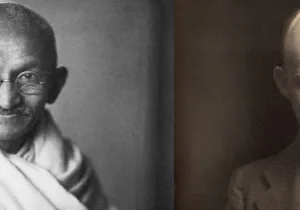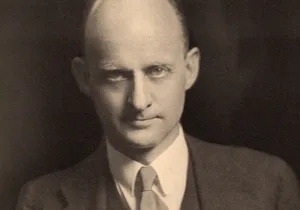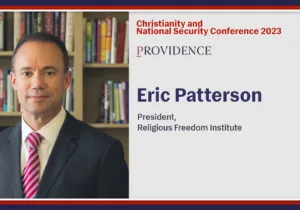On May 3rd, 1942, Lieutenant General John L. DeWitt issued Civilian Exclusion Order No. 34, ordering all people of Japanese ancestry, whether American citizens or not, to evacuate their homes in California and parts of Oregon, Washington, and Arizona and relocate to internment camps deeper in the interior of the United States.
The order brought to completion a sequence of events that began in February, when President Roosevelt signed Executive Order 9066, which allowed regional military commanders within the United States to designate at their own discretion “military areas” from which “any or all persons may be excluded.” With public opinion along the West Coast shifting amid fears that a Japanese attack might be abetted by fifth columnists among the Japanese community, eventually more than 110,000 Japanese immigrants and Japanese Americans would be interned. The camps did not close until 1945.
In 1988, President Reagan officially apologized for the internment on behalf of the U.S. government and issued restitution payments of $20,000, worth roughly $63,000 today, to nearly 82,000 surviving detainees, totaling approximately $1.6 billion in redress. While such payments can be added to restitution made shortly after the war, many of those interned had nothing left to return to when released at war’s end. They had lost everything in the course of their confinement.
Reinhold Niebuhr’s Christianity & Crisis magazine spoke—and speaks—for many Americans when they declared the relocation of the Japanese a blot on the national record. One editorial following the first wave of relocations compared the philosophy undergirding the Executive Order to that grounding the Nuremberg Laws. Under the claim of emergency conditions, “Sixty thousand Americans who legally possess every safeguard to liberty under the Constitution and the Bill of Rights have been informed that they must move from their homes, their professions, their jobs, their lands, or be forcibly ejected by the government.” Defending this editorial position, Niebuhr urged readers against the view that held “all actions of government in wartime as sacrosanct.”
Of course, especially in our sensitive age, such an event as this is ripe for sensationalist polemics and misinformed hysteria. Many will fall over themselves to insist this proves that governments are inherently evil, or that white Americans or Western culture generally is simply xenophobic, jingoistic, and venomously racist. One could imagine campus snowflakes who, despite their quarter-of-a-million dollar educations, would be incapable of seeing any possible rational justification for such actions that might excuse, even if in the barest dimensions, some of the grounding motives of decision makers.
Indeed, some modest defense can be offered. Fresh off the Japanese attacks on Pearl Harbor, Americans had cause for concern following an event on the island of Niihau, in Hawaii, where a Japanese pilot, participating in the surprise attack, had crashed landed. Islanders, including several Japanese Americans, apprehended him. Over the course of his short confinement, the Japanese pilot managed to cajole several of his Japanese American captors to help him escape. They attempted to do so but, eventually, were overwhelmed by their neighbors, including loyal Japanese immigrants. The pilot was killed, and those Americans who helped him break free committed suicide. While an isolated incident, it nevertheless put in the minds of those responsible for American national security the possibility that ordinary Japanese Americans might be capable of subversive activity against the U.S.—and puts to rest any claim that there is no documented evidence of Japanese American sabotage. Fear of betrayal was exacerbated by the Empire of Japan’s own racist ideology, in the face of which decision-makers had cause to wonder whether Japanese Americans shared such racist views. While the racist rhetoric and actions of the Japanese homeland shouldn’t be presumed without cause of all Japanese, at play here is a clear example that sin begets sin—fear of Japanese racism bred a racist response in kind.
Against all this, Niebuhr made some simple points that shouldn’t be heavy lifts. The first was a demand for basic discrimination: that it was incumbent upon the U.S. to distinguish between those Japanese Americans who had given every indication that they were loyal and those who gave reason to be wary. He admitted to having no doubt that there were, or could be, disloyal members within the Japanese American community. He simply argued that, until one faced a situation of last resort, that there was time for less drastic methods to deal with the potential peril.
Niebuhr is well known both for believing the war against Nazism and Japanese militarism needed to fought and that the gloves should come off to fight for the win. Still, his call for discrimination extended, he urged, to distinguishing between essential liberties, upon which democratic governments rest, and more peripheral liberties, which might be curtailed in emergencies. “The mass evacuation of Americans,” he suggested, “without due process of law must certainly be regarded as the abrogation of an essential right.”
Because it was, Niebuhr understood that in striving for American security, America had hobbled itself in other, equally essential, dimensions. To get at this, he recorded a letter from a Japanese American pastor. The pastor describes the “uncertainty, fear, and heartbreaking disappointment” of those in his congregation. His flock did not, in the days of war, expect to live lives of calm, but it was nevertheless “a blow to America-loving, peaceful, permanent residents who have lived in America for 30-50 years to be suddenly classified as ‘enemy aliens’ and receive treatment as such.” He points to the extraordinary service many Japanese Americans were already doing in the American armed forces as a model of the general patriotic fervor of the Japanese American community. Indeed, over 5,000 Japanese were already in service, and many more would follow when the draft would be extended to include Japanese Americans in confinement. That so many Japanese answered this call despite their treatment points to an extraordinary capacity for virtue that all Americans ought to be proud to claim as deeply American. Meanwhile, this pastor insisted, he and his people were, through their confinement, “Willing to go a second mile in serving and suffering for our nation.” We ought to relish calling such as these our neighbors and fellow countrymen.
The record shows that America has learned from its errors in WWII. Our subsequent wars and, most especially, the days following the September 11th attacks, are notable in their stark contrast to our treatment of Japanese Americans in the days after Pearl Harbor.
We are not perfect, but we have mostly avoided further blots on our national character.
—
Marc LiVecche is managing editor of Providence
Image: First-graders, some of Japanese ancestry, at the Weill public school, San Francisco, Calif., pledging allegiance to the United States flag. The evacuees of Japanese ancestry will be housed in War relocation authority centers for the duration of the war. credit: U.S. War Relocation Authority. Via US Library of Congress







 Sponsor a student for Christianity & National Security 2024
Sponsor a student for Christianity & National Security 2024